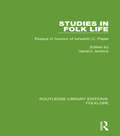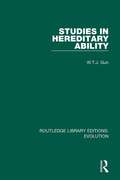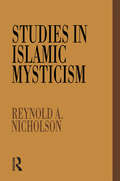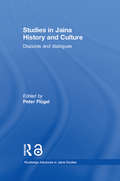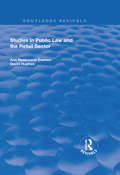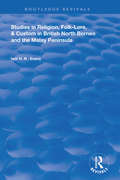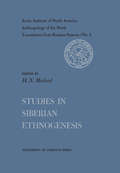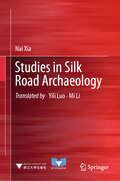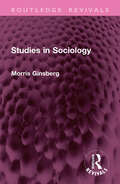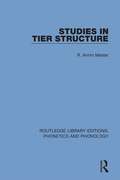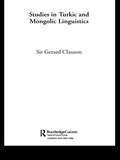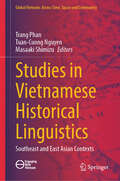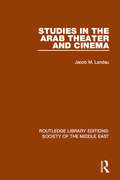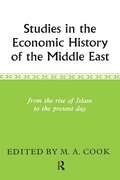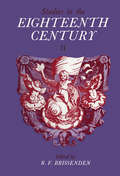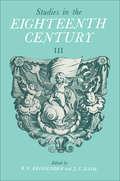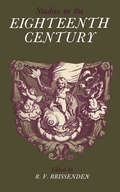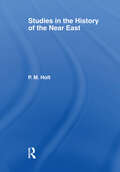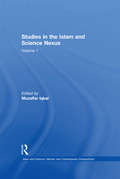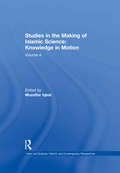- Table View
- List View
Studies in Ethnomethodology
by Harold GarfinkelEthnomethodology involves a multifaceted focus on the local social orders.
Studies in Folk Life: Essays in Honour of Iorwerth C. Peate (Routledge Library Editions: Folklore)
by Geraint JenkinsThis collection, first published in 1969, presents essays written by twenty of the most eminent scholars from the British Isles and Europe on aspects of folk life studies. The essays are written in honour of Dr Iorwerth C. Peate, Curator of the Welsh Folk Museum and doyen of folk life studies in Britain, to mark his retirement as the first President of the Society for Folk Life Studies. In the present book all the various aspects of folk life, from linguistics to sociology, from architecture to agrarian history, are covered, reflecting the wide interests of Dr Peate and his valuable contribution to the development of the study of traditional life in Britain.
Studies in Hereditary Ability (Routledge Library Editions: Evolution #4)
by W.T.J. GunOriginally published in 1928, Studies in Hereditary Ability studies the genealogy of great families of Britain and America and examines how their ancestors influenced their genetics and who they subsequently ended up becoming. The book examines the descent of ability through both maternal and paternal lines, and seeks to argue that from both sides, there stems an equal chance of inheritance. At the time of publication maternal genealogy was relatively unexplored and the book examines the influence of the maternal line on hereditary genetics, as well as the early influence of the mother on a child’s environment. The book also examines the links between leadership and intelligence, and maps the genealogy of writers, scientists and artists, and proposes that these notable figures were more likely to have had notable relatives. Although very much of its time, the book will provide a unique and interesting read for social historians, anthropologists and genealogists alike.
Studies in Intellectual History
by George BoasOriginally published in 1953. In this collection of essays, prominent midcentury intellectual historians provide critical essays on their field of specialty. Studies in Intellectual History gathers work by Harold Cherniss, George Boas, Ludwig Edelstein, Leo Spitzer, and others.
Studies in Islamic Mysticism
by Reynold A. NicholsonA re-issue in paperback of Nicholson's classic survey of the field of Islamic mysticism. Intended as reading for students of sufism, philosophy and literature, it also provides an introduction to the translations of both R.A. Nicholson and A.J. Arberry.
Studies in Jaina History and Culture: Disputes and Dialogues (Routledge Advances in Jaina Studies)
by Peter FlügelThe last ten years have seen interest in Jainism increasing, with this previously little-known Indian religion assuming a significant place in religious studies. Studies in Jaina History and Culture breaks new ground by investigating the doctrinal differences and debates amongst the Jains rather than presenting Jainism as a seamless whole whose doctrinal core has remained virtually unchanged throughout its long history. The focus of the book is the discourse concerning orthodoxy and heresy in the Jaina tradition, the question of omniscience and Jaina logic, role models for women and female identity, Jaina schools and sects, religious property, law and ethics. The internal diversity of the Jaina tradition and Jain techniques of living with diversity are explored from an interdisciplinary point of view by fifteen leading scholars in Jaina studies. The contributors focus on the principal social units of the tradition: the schools, movements, sects and orders, rather than Jain religious culture in abstract. Peter Flügel provides a representative snapshot of the current state of Jaina studies that will interest students and academics involved in the study of religion or South Asian cultures.
Studies in Legal History: Fractional Freedoms
by Mckinley Michelle A.Fractional Freedoms explores how thousands of slaves in colonial Peru were able to secure their freedom, keep their families intact, negotiate lower self-purchase prices, and arrange transfers of ownership by filing legal claims. Through extensive archival research, Michelle A. McKinley excavates the experiences of enslaved women whose historical footprint is barely visible in the official record. She complicates the way we think about life under slavery and demonstrates the degree to which slaves were able to exercise their own agency, despite being ensnared by the Atlantic slave trade. Enslaved women are situated as legal actors who had overlapping identities as wives, mothers, mistresses, wet-nurses and day-wage domestics, and these experiences within the urban working environment are shown to condition their identities as slaves. Although the outcomes of their lawsuits varied, Fractional Freedoms demonstrates how enslaved women used channels of affection and intimacy to press for liberty and prevent the generational transmission of enslavement to their children.
Studies in North American Indian History: Apache Adaptation to Hispanic Rule
by Matthew BabcockAs a definitive study of the poorly understood Apaches de paz, this book explains how war-weary, mutually suspicious Apaches and Spaniards negotiated an ambivalent compromise after 1786 that produced over four decades of uneasy peace across the region. In response to drought and military pressure, thousands of Apaches settled near Spanish presidios in a system of reservation-like establecimientos, or settlements, stretching from Laredo to Tucson. Far more significant than previously assumed, the establecimientos constituted the earliest and most extensive set of military-run reservations in the Americas and served as an important precedent for Indian reservations in the United States. As a case study of indigenous adaptation to imperial power on colonial frontiers and borderlands, this book reveals the importance of Apache-Hispanic diplomacy in reducing cross-cultural violence and the limits of indigenous acculturation and assimilation into empires and states.
Studies in North American Indian History: Indigenous Intellectuals
by Kiara M. VigilIn the United States of America today, debates among, between, and within Indian nations continue to focus on how to determine and define the boundaries of Indian ethnic identity and tribal citizenship. From the 1880s and into the 1930s, many Native people participated in similar debates as they confronted white cultural expectations regarding what it meant to be an Indian in modern American society. Using close readings of texts, images, and public performances, this book examines the literary output of four influential American Indian intellectuals who challenged long-held conceptions of Indian identity at the turn of the twentieth century. Kiara M. Vigil traces how the narrative discourses created by these figures spurred wider discussions about citizenship, race, and modernity in the United States. Vigil demonstrates how these figures deployed aspects of Native American cultural practice to authenticate their status both as indigenous peoples and as citizens of the United States.
Studies in Public Law and the Retail Sector
by Ann R Everton David J HughesThis title was first published in 2000: Part 1 Shifting patterns of retailing - a journey to and through the "golden age": highlights of the earlier history; the post-war decades - the '50s, '60s and '70s; the "retail revolution" of the '80s - the creation of the "golden age"; the early and middle '90s - less certain times...and a "watershed". Part 2 Planning control and retail developments: the policy; policy into practice - the law in operation. Part 3 Competition law and policy and retailing: preliminary observations; the domestic law - up to the Competition Act 1998; domestic law reform - the new Act; the European law; the approach to price discrimination and mergers; a consideration of certain further major issues. A postscript - in the "millennium spirit".
Studies in Religion, Folk-Lore, and Custom in British North Borneo and the Malay Peninsula (Routledge Revivals)
by Ivor H. EvansOriginally published in 1923, the following papers contain the results of investigations concerning religion and custom in Borneo and the Malay Peninsula, which were carried out at intervals during the years 1910 to 1921 by the author. It includes chapters on the customs and beliefs of the 'Orangdusun', beliefs and customs of the Sakai, and Malay folk-tales.
Studies in Siberian Ethnogenesis (Arctic Institute of North America Anthropology of the North #2)
by Henry MichaelThis collection of translations from articles by Russian scholars continues the valuable contribution to Western knowledge of the anthropology of the North which is being made under the sponsorship of the Arctic Institute of North America. The subjects treated include: "The Ethnic Affiliation of the Population in the Northwest of the Yakut A.S.S.R." (with related papers); "Ancient Petroglyphs and Modern Decorative Art in the Amur Region"; "Contributions to the History of the Buryat People"; "On the Origin of the Kirgiz People"; "The Origins and Ethnic Composition of the Koybals"; "Volga-Oka Place Names and Some Problems of the Ethnogenesis of the Finno-Urgic Peoples of the Nganasans," nomadic hunters of tundra and forest like many of the other tribes studied. Volume II in the series Anthropology of the North: Translations from Russian Sources.
Studies in Silk Road Archaeology
by Nai XiaThis book is a collection of Nai Xia’s quintessential works on Silk Road studies. A key resource in the field of Silk Road Archaeology, it features in-depth content, a broad range of material, careful textual research, and meticulous analysis. With thorough investigations of foreign coinage, silk textiles, and artifacts with foreign styles excavated in different parts of China, it explores the exchange between ancient China and Central Asia, Western Asia, and Europe. In particular, this book provides detailed descriptions of the economic and cultural ties between ancient China, Pre-Islamic Arabia, the Sasanian Empire, and the Byzantine Empire. The research propounds innovative theories on the history and evolution of East-West transportation routes, i.e., the overland Silk Road and the Maritime Silk Road. Based on the study of ancient relics and excavated artifacts, it points out that cultural exchange along the Silk Road was never unilateral, but instead, mutual influence and cooperation were obvious. Since ancient times, countries along the Silk Road have had a tradition of amicable foreign relations and the promotion of common interests. The book is intended for academics, scholars and researchers.
Studies in Sociology (Routledge Revivals)
by Morris GinsbergFirst published in 1932, Studies in Sociology consists of essays that fall into three groups, the first concerned with the scope and method of sociology and its relation to history and social philosophy; the second devoted to an analysis of the theory of evolution as applied to society, and to a number of problems in social psychology, such as the nature of social purpose, the place of instinct in social science, the relation between instinct and emotion, and the inheritance of mental characters; while the third group deals with the claims of Eugenics, and social classes and social mobility. This book will be of interest to students of sociology, history and philosophy.
Studies in Tier Structure (Routledge Library Editions: Phonetics and Phonology #18)
by R. Armin MesterFirst published in 1988. This study examines a number of issues arising in multitiered nonlinear phonology in the light of the Obligatory Contour Principle (OCP), which prohibits adjacent identical elements at the melodic level, and aims to provide another kind of evidence for segment-internal tier articulation. This title will be of particular interest to students of linguistics.
Studies in Turkic and Mongolic Linguistics (Royal Asiatic Society Books)
by Gerard ClausonThis book, now back in print having been unavailable for many years, is one of the most important contributions to Turkic and Mongolic linguistics, and to the contentious 'Altaic theory'. Proponents of the theory hold that Turkish is part of the Altaic family, and that Turkish accordingly exists in parallel with Mongolic and Tungusic-Manchu. Whatever the truth of this theory, Gerard Clauson's erudite and vigorously expressed views, based as they were on a remarkable knowledge of the lexicon of the Altaic languages and his outstanding work in the field of Turkish lexicography, continues to command respect and deserve attention.
Studies in Vietnamese Historical Linguistics: Southeast and East Asian Contexts (Global Vietnam: Across Time, Space and Community)
by Trang Phan Tuan-Cuong Nguyen Masaaki ShimizuThis book facilitates constructive interdisciplinary dialogue among linguistics and philology specialists concerning various languages in Vietnam, East Asia, and Southeast Asia. The book’s principal objective is to investigate the interdisciplinary nature of language change, with a particular focus on analyzing the structural and socio-cultural components of the evolution of specific linguistic phenomena over time. The book concentrates on the five primary language families in the East and Southeast Asian linguistic arena, namely Austroasiatic, Tai-Kadai, Sino-Tibetan, Austronesian, and Hmong-Mien. In doing so, it develops understanding of the extent to which language change is the result of language-internal mechanisms, prolonged contact with other languages within the same linguistic area, and the surrounding socio-cultural milieu. Given that Vietnam presents a linguistic microcosm of the East and Southeast Asia region, the book is divided into two sections. The first centers on historical linguistics relating to major languages based in Vietnam, including Vietnamese and its significant neighbors, Tay and Nung. The subsequent section examines the transformations observable in other languages prevalent across East and Southeast Asia that are historically, typologically, and geographically related to languages from Vietnam, including Chinese, Formosan, and Philippine languages, as well as Hmongic languages. A product of a workshop sponsored by the Harvard Yenching Institute held at the Institute of Sino-Nom Studies, this book encompasses a significant contribution to the field of Vietnamese historical linguistics, which has been notably underexplored in academic research. It is relevant to linguists, philologists, historians, anthropologists, and cultural scholars interested in Vietnam in particular, and the Southeast and East Asian cultural and linguistic landscape at large.
Studies in the Arab Theater and Cinema (Routledge Library Editions: Society of the Middle East #20)
by Jacob M. LandauThe Arab theatre and cinema are among the most neglected subjects in the studies of Oriental literature and research into the history of theatre. This book, written by the acclaimed scholar Jacob M. Landau and first published in 1958, is a survey of the development of the Arab theatre and cinema as cultural and social phenomena and goes a long way in shedding some light on these neglected subjects.
Studies in the Economic History of the Middle East: From The Rise Of Islam To The Present Day
by M. A. CookFirst Published in 2004. Did medieval Muslims have the concept of a 'social class'? If not, can we usefully employ the term in analysing their society? Were there such things as guilds in the medieval Middle East? Would we understand the economic de- cline of Mamluk Egypt better if we used paradigms derived from the study of the economic history of England and Italy in the fourteenth and fifteenth centuries? How much can the enormous fiscal archive of the Ottoman Empire tell us about population history? Why was the Middle East so backward, if indeed it was, compared with the rest of the Afro-Asian world in the nineteenth century? Have Iran and Iraq better prospects for economic growth than otherwise comparable countries thanks to their oil royalties? Or are these paradoxically a hindrance rather than a help? The study of the economic history of the Middle East in Islamic times is notoriously underdeveloped. This volume contains papers discussed at an international conference held at the School of Oriental and African Studies in 1967, together with three short critical essays which attempt to tie them together. Some papers are specific contributions to research, others survey wider areas. The volume is not a comprehensive history or a systematic inventory, but it is hoped that, in addition to presenting a set of papers which are interesting in themselves, it will give the reader a tolerable idea of the state of studies in the field.
Studies in the Eighteenth Century II
by R. F. BrissendenThis volume presents an array of studies on many aspects of the eighteenth century: on the novel, history, the history of ideas, drama, poetry and sentimentality. The essays are as diverse as 'Pope's Essays on Man and the French Enlightenment' and 'Of Silk-worms and Farthingales and the Will of God.' One group is concerned with the works and ideas of Bayle, Alexander Gerard, Diderot, Fuseli, Hawkesworth and Swift among others.The essays are the work of leading scholars for many disciplines and were presented at the Second David Nichol Smith Seminar; together they reflect some of the liveliest and most up-to-date trends in the present reexamination of the period. The book will be invaluable to all students of the literature, thought, and civilisation of the eighteenth century.
Studies in the Eighteenth Century III
by R. F. Brissenden J. C. EadeThis volume of essays, from the Third David Nichol Smith Memorial Seminar, continues the valuable and lively tradition established in the two earlier seminars and volumes.The essays, by distinguished international scholars, range over many of the topics that make the eighteenth century a rich area of study: the burgeoning of ideas about man and his place in the world, social history, philosophy and literature, literary criticism and traditions, the poetry and prose of the giants of the age.For all students of eighteenth-century studies this book will be vital reading.
Studies in the Eighteenth Century: Papers presented at the David Nichol Smith Memorial Seminar Canberra 1966
by R. F. BrissendenThe papers brought together in this volume bear witness to the growing vigour and diversity of eighteenth-century studies. The seminar at which they were presented was held to honour the memory of a literary scholar, David Nichol Smith. It is therefore understandable and fitting that the majority of the contributions should be concerned primarily with literature. History, art, and philosophy, however, are also dealt with; and the collection as a whole offers a widely ranging and illuminating survey of the period.
Studies in the History of the Near East
by P.M. HoltFirst Published in 1973. Routledge is an imprint of Taylor & Francis, an informa company.
Studies in the Islam and Science Nexus: Volume 1 (Islam and Science: Historic and Contemporary Perspectives)
by Muzaffar IqbalThis volume brings together thematically arranged articles on the relationship between Islam and science and how it has been shaped over the last century. The articles represent a broad variety of approaches and perspectives as well as reflective and analytic views and include some of the most important voices in the Islam and science discourse. This collection, which includes a special section devoted to studies that explore various aspects of the relationship between the Qur'an and science, is a valuable resource for researchers interested in gaining a greater understanding of the broader relationship between religion and science.
Studies in the Making of Islamic Science: Volume 4 (Islam and Science: Historic and Contemporary Perspectives)
by Muzaffar IqbalSituated between the Greek, Indian and Persian scientific traditions and modern science, the Islamic scientific tradition received, enriched, transformed and then bequeathed scientific knowledge to Europe. The articles selected for this volume explore the fascinating process of knowledge in motion between different civilizations.

